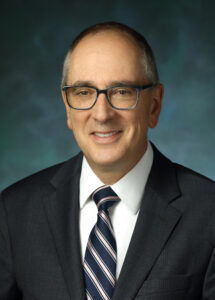At first Dr. O’Shea didn’t see his name on the roster, but then his email inbox was flooded with congratulatory notes. “It was very exciting,” he says, when he realized that he was now “in the Big Leagues!”
Membership in the 160-year-old NAS is widely regarded as a sign of excellence in scientific research. Dr. O’Shea has received numerous other awards and prizes for his work, including the ASCI-Harrington Prize (which The Rheumatologist reported on two years ago), the Howley Prize for Research in Arthritis, the Ross Prize in Molecular Medicine and six NIH Director’s Awards. More important to Dr. O’Shea than this latest honor, though, is “the privilege of working here at the NIH [National Institutes of Health, NIAMS, Bethesda, Md.].”
Dr. O’Shea began his time at the NIH more than 40 years ago and for 18 years has been the NIAMS scientific director. He holds his NIH colleagues in high esteem and values the vigorous, collaborative spirit of research. One of the most exciting facets of his current position is the opportunity to mentor young and developing scientists, he says. More than 70 researchers have come through his laboratory and gone on to faculty positions; more than 40 have attained tenured positions and chairs of their institutions’ departments. And during the period of the pandemic, “it was a real joy to be surrounded by trainees who are on fire about the science—who have energy, commitment, dedication and altruism about this work.”
Dr. O’Shea continues to experience excitement about the evolving understanding of the pathways impinging on inflammation in the autoimmune diseases. Research such as the June 15 study published in the New England Journal of Medicine, “Variant STAT4 and Response to Ruxolitinib in an Autoinflammatory Syndrome,” continues to build on his seminal work with Janus kinase inhibitors and exemplifies the vibrant work at the NIH.
“We’re beginning to understand the logic of all these switches in the genome that control key inflammatory factors,” he says. “It would be wonderful if we could measure all those things in patients in real time and then figure out the combination of medications we should be using [for] any given patient.”
 Antony Rosen, MBChB, MS, Elected an American Association for the Advancement of Science Fellow
Antony Rosen, MBChB, MS, Elected an American Association for the Advancement of Science Fellow
Antony Rosen, MBChB, MS, the vice dean for research and director of the Division of Rheumatology, the Johns Hopkins University School of Medicine, Baltimore, has been recognized numerous times for his advances in clinical and translational research, as well as his teaching, mentoring and leadership. Last October, he was elected as a Fellow to the American Association for the Advancement of Science.



